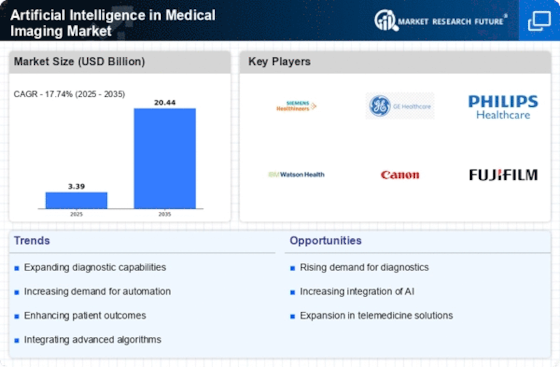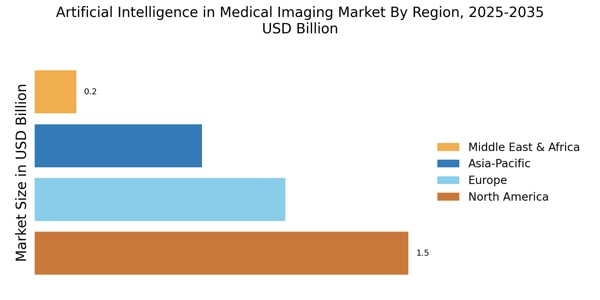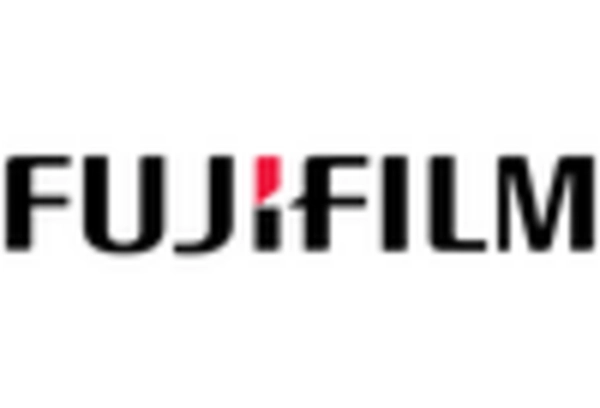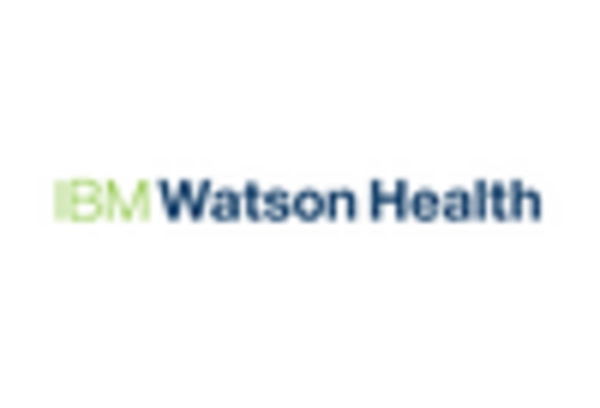Growing Aging Population
The growing aging population is a critical driver for the Artificial Intelligence AI in Medical Imaging Market. As the global demographic landscape shifts, the prevalence of age-related health conditions is on the rise, necessitating advanced imaging solutions for accurate diagnosis and treatment. Older adults often require more frequent medical imaging, which places additional demands on healthcare systems. AI technologies are increasingly being adopted to streamline imaging processes, reduce wait times, and enhance diagnostic capabilities. Projections indicate that by 2030, the number of individuals aged 65 and older will surpass 1 billion, further amplifying the need for efficient and effective medical imaging solutions. This demographic trend underscores the importance of integrating AI into imaging practices to meet the evolving healthcare needs of the aging population.
Regulatory Support for AI Integration
Regulatory support for AI integration is emerging as a vital driver for the Artificial Intelligence AI in Medical Imaging Market. Regulatory bodies are recognizing the potential benefits of AI technologies in enhancing diagnostic accuracy and patient safety. As a result, there is a growing trend towards establishing frameworks that facilitate the approval and implementation of AI-driven imaging solutions. Recent initiatives have been launched to streamline the regulatory process for AI applications in healthcare, which could lead to faster market entry for innovative products. This supportive regulatory environment is likely to encourage investment and research in AI technologies, fostering a more robust market landscape. As of October 2025, the alignment of regulatory policies with technological advancements appears to be a promising development for the future of AI in medical imaging.
Rising Demand for Diagnostic Accuracy
The increasing emphasis on diagnostic accuracy is a primary driver for the Artificial Intelligence AI in Medical Imaging Market. Healthcare providers are under pressure to enhance patient outcomes, leading to a growing reliance on AI technologies that can analyze imaging data with remarkable precision. According to recent estimates, the market for AI in medical imaging is projected to reach USD 2.5 billion by 2026, reflecting a compound annual growth rate of approximately 30%. This surge is largely attributed to the ability of AI algorithms to detect anomalies that may be overlooked by human radiologists, thereby improving diagnostic confidence and reducing the likelihood of misdiagnosis. As healthcare systems strive for excellence in patient care, the integration of AI into imaging practices appears to be an essential strategy.
Technological Advancements in AI Algorithms
Technological advancements in AI algorithms are significantly propelling the Artificial Intelligence AI in Medical Imaging Market. Innovations in machine learning and deep learning techniques have enhanced the capabilities of AI systems, enabling them to process vast amounts of imaging data efficiently. These advancements facilitate the development of sophisticated algorithms that can identify patterns and anomalies in medical images with unprecedented accuracy. The market is witnessing a surge in AI applications, particularly in radiology, pathology, and oncology, where the demand for precise imaging analysis is paramount. As of 2025, the market is expected to experience a robust growth trajectory, driven by the continuous evolution of AI technologies that promise to revolutionize diagnostic imaging.
Increased Investment in Healthcare Technology
Increased investment in healthcare technology is a significant driver for the Artificial Intelligence AI in Medical Imaging Market. Governments and private entities are channeling substantial funds into healthcare innovation, recognizing the potential of AI to transform medical imaging practices. This influx of capital is fostering research and development initiatives aimed at creating advanced AI solutions that enhance imaging accuracy and efficiency. For instance, funding for AI-driven imaging projects has seen a notable rise, with estimates suggesting that investments could exceed USD 1 billion annually by 2025. Such financial backing not only accelerates technological advancements but also encourages collaboration between tech companies and healthcare providers, further solidifying the role of AI in medical imaging.

















